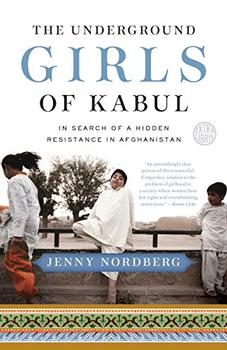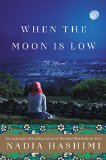Summary | Excerpt | Reading Guide | Discuss | Reviews | Beyond the book | Read-Alikes | Genres & Themes | Author Bio

In Search of a Hidden Resistance in Afghanistan
by Jenny NordbergIn The Underground Girls of Kabul, award-winning journalist Jenny Nordberg investigates a practice she discovered while pursuing a story in Afghanistan: that of parents dressing their young daughters as boys and allowing them to fill the role of sons for their families.
The author discovered the custom, called bacha posh, (translated as "dressed like a boy") almost by accident. She was interviewing Azita, a female politician, when one of the woman's daughters let slip that the youngest "son" was really a girl. Until the child's mother confirmed the story, Nordberg wasn't sure she'd heard correctly. She started wondering if it had been a one-off occurrence or if this type of masquerade could be more widespread in Afghanistan. Nordberg initially thought it was impossible: "Anthropologists, psychologists, and historians would surely also have taken note," she writes, "as such a thing would seem to go against the common understanding of Afghanistan's culture, where one dresses strictly according to gender...Ergo, such a practice – if it was really a practice and not just an oddity – must not exist. Gender segregation in Afghanistan is among the strictest in the world, I was repeatedly told, making such an act unthinkable. Dangerous, even."
As she dug deeper Nordberg found nearly everyone knew of bacha posh, and that it was an accepted and uncontroversial practice provided the girl reverts to female dress and assumes the traditional role before she enters puberty. It is also an old custom; one grandmother told her that "Afghan girls dressed as boys when there were no weapons, only bows and arrows." Incidentally both the practice and the daughter who is passed off as a son are labeled bacha posh.
Nordberg attributes the custom to the fact that the culture revolves around men, and consequently many families feel a desperate need to produce a son:
Having at least one son is mandatory for good standing and reputation here. A family is not only incomplete without one; in a country lacking rule of law, it is also seen as weak and vulnerable. So it is incumbent upon every married woman to quickly bear a son – it is her absolute purpose in life, and if she does not fulfill it, there is clearly something wrong with her in the eyes of others.
Because women are so limited in this conservative Muslim culture, sons play a crucial role. They protect and care for their sisters before they are married, and care for their parents as they age; they can help the family fight or flee during times of war; can inherit and pass on the family's property; work and earn a salary to support their families; they can accompany sisters and mothers when they venture outside their homes; and run errands. Most Afghan women can do none of these things, and while the girls designated as bacha posh can't fulfill all the duties of an adult son, they do help the family avoid the stigma of being sonless (for example, Azita would never have been elected had she not been the mother of a "son"; she would have been seen as too weak). There's also a superstition played out time and time again that if you create a make-believe son, your next child will be male. Also, some of the more liberal parents who have a bacha posh believe that transforming a girl child into a boy allows her to become more educated and confident - perhaps attracting a similarly educated and successful husband who may even allow her to work outside the home - thereby improving the family's station.
The author points out that because the practice is so hidden no one has studied the phenomenon and consequently no one knows what impact it has had on the psyche of those who've been bacha posh. Most of the parents interviewed seemed to simply take it for granted that the girl will simply adapt to the role she's expected to fulfill, with no gender confusion resulting from her having been treated as a boy throughout her early years. The transition is not always easy, however, with some bacha posh girls refusing to revert to a feminine identity (such as sixteen-year-old Zahra, who eventually dropped out of school because she could "no longer bear exhortations by her Pashto teacher to dress like a woman.") For those adult women who have been bacha posh there are differing opinions as to whether or not the experience was helpful; Azita, herself once a bacha posh, says the experience gave her the confidence to talk to men and consequently have a political career, while Shukria, a nurse, blames her upbringing for the failure of her marriage – she simply couldn't be a traditional enough wife for her husband.
Nordberg is at her best as she interviews several bacha posh she met during her research. She relays her conversations with a wide range of girls and women, from six-year-old Mehran, who is expected to return to being a female in a few years, to thirty-four-year-old Nader who refused to give up the freedoms of a male and so continues masquerading as a man (and in doing so has decided to never marry and to endure the ongoing contempt of her brothers). Their stories are compelling and exceptionally interesting, as are those of the other Afghan women and children; the author has a remarkable ability to bring her subjects to life.
Much of the book also concerns the condition of women's rights in Afghanistan (a country which the author states "…the United Nations calls the worst place in the world to be born. And the most dangerous place in which to be a woman.") Few Westerners who have even a passing knowledge of Afghan culture will find much of what Nordberg writes along these lines to be surprising; most are aware of the deplorable lack of freedom experienced by women in this conservative country. Although this material isn't new, the freshness keeps the information interesting. So much is told through the stories of Afghan women that it rings with authenticity; the book is fascinating from start to finish.
I did think the text got a little bit preachy at times as the author expressed her opinion of both the situation in Afghanistan regarding women's rights and the practice of bacha posh; at times the material felt overly judgmental. I would have expected less anger and more distance in a narrative written by a journalist. It also seemed a bit naïve of the author to be so surprised that the custom of dressing girls as boys exists in such an overwhelmingly patriarchal society. But, getting to know the remarkable people Nordberg interviews more than offsets these complaints.
The Underground Girls of Kabul is quite entertaining and would be a good primer for anyone looking to know more about women's rights in Afghanistan. Those interested in the custom of bacha posh or simply keen on finding a good human-interest story are sure to find the book to be a fascinating read. I especially recommend it as a book-group selection; with its discussion of gender roles and women's rights it will certainly generate good conversation.
![]() This review was originally published in The BookBrowse Review in October 2014, and has been updated for the
August 2015 edition.
Click here to go to this issue.
This review was originally published in The BookBrowse Review in October 2014, and has been updated for the
August 2015 edition.
Click here to go to this issue.

If you liked The Underground Girls of Kabul, try these:

by Nadia Hashimi
Published 2016
Mahmoud's passion for his wife Fereiba, a schoolteacher, is greater than any love she's ever known. But their happy, middle-class world—a life of education, work, and comfort—implodes when their country is engulfed in war, and the Taliban rises to power.

by Khaled Hosseini
Published 2014
Khaled Hosseini has written a new novel about how we love, how we take care of one another, and how the choices we make resonate through generations
Your guide toexceptional books
BookBrowse seeks out and recommends the best in contemporary fiction and nonfiction—books that not only engage and entertain but also deepen our understanding of ourselves and the world around us.